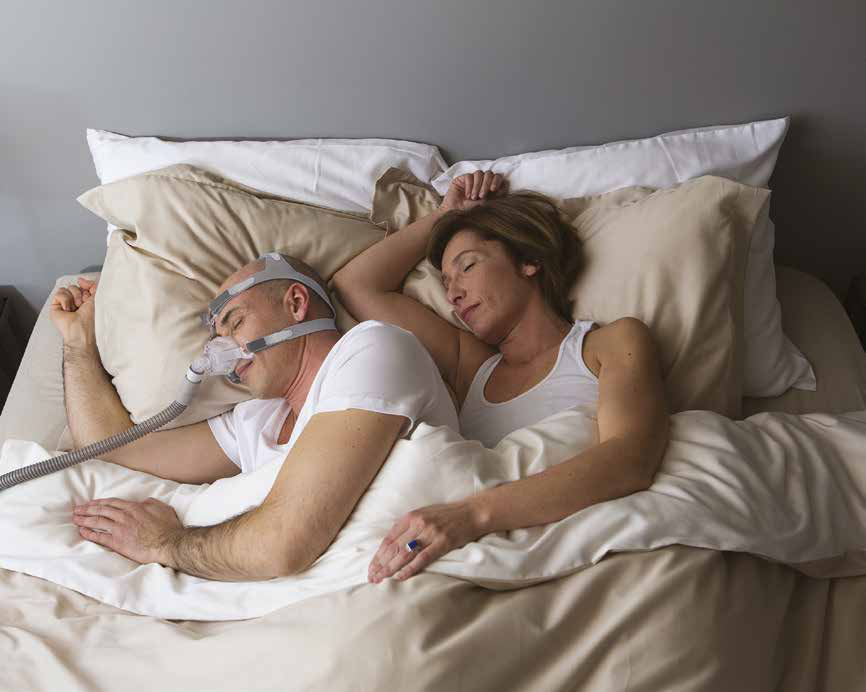Last updated on July 7th, 2023 at 01:27 pm
Most people snore occasionally, and over 40% of adults in the UK snore regularly.
Snoring is extremely common and affects the quality of your sleep.
In some cases, snoring could also indicate a sleep disorder.
This article will explain what snoring is and how to stop snoring.
Why Do I Snore?
You might be wondering why you snore; snoring occurs when your airway narrows, and therefore the air passing through vibrates the tissue in the back of your throat.
Sometimes, a person’s throat can narrow so much that the airway becomes completely obstructed, causing them to stop breathing altogether – up to 30 times per hour per night.
This is called Obstructive Sleep Apnoea (OSA).
As well as extreme fatigue and irritability, OSA has been linked to several other health conditions, including diabetes, stroke, obesity, depression and heart disease.
If you snore and experience similar issues to those stated above – do not ignore it.
A number of steps can be taken to combat snoring and reduce symptoms of OSA.
What Causes Snoring?
People snore for different reasons, so it is important to find out why you snore.
Once you understand why you snore, you’re a step closer to getting more restful sleep.
Here are some common causes of snoring:
- Being overweight – Excess fat and fatty tissue around your throat and neck.
- Your age – When we age, our throats become narrower, and the muscle tone in our throats also decreases. Those over 35 are more prone to snoring; there are lifestyle changes that can help with this.
- Sinus and nasal problems – Blocked airways can make breathing difficult at night.
How To Stop Snoring
Snoring can affect your quality of sleep and your bed partners, here are ways to stop snoring:
- Maintain a healthy weight – People that are overweight are far more at risk of experiencing and developing snoring or OSA. This is because, with an increase in weight, there is an increase in tissue – which will further add to the pressure, and potential obstruction, on a person’s airway. It is also worth mentioning that maintaining a healthy weight will also bring about several other health benefits. Read more on foods that can affect your sleep.
- Sleep on your side – Sleeping on your side relieves a lot of pressure from the back of your throat. Although it may not reduce the snoring altogether, it can often make the snoring a lot quieter and easier for a bed partner to deal with. Those with positional OSA can use positional therapy treatment.
- Say NO to alcohol before bed – Alcohol can affect your sleep. Drinking alcohol will further cause the muscles and tissue in the back of the neck to relax, increasing the chance of snoring. Additionally, alcohol can also prevent a person from reaching the deep level of sleep required to restore and repair. Although alcohol may help you nod off – it will harm the quality of sleep you achieve
- Stop smoking – Nicotine can cause inflammation in your airways, making breathing harder at night. Nicotine encourages snoring because it obstructs your airflow – Smoking can worsen Sleep Apnoea.
- Clear your nasal passages – Particularly during winter, or if you are susceptible to colds, flu or hay fever – the congestion in your airways could contribute further to your snoring. Several treatments are available to help clear your passages before going to bed, reducing the risk of snoring. One of these treatments is called SinuPulse – which will clear out the nasal passage of mucus, bacteria and particles using a saline solution. Please take a look at our sinus and nasal care for more options.
- Continuous Positive Airway Pressure (CPAP) – If you snore and are experiencing the symptoms described above – it is most definitely worth getting tested for Obstructive Sleep Apnoea. If diagnosed, you can begin CPAP therapy – which involves a CPAP machine, CPAP mask and CPAP hose – that will pump air through the airway as you sleep, preventing the airway from obstructing.
Symptoms of OSA
Do you have any of the following Sleep Apnoea symptoms?
- Gasping or choking during sleep
- Poor concentration and memory
- Lack of interest in sex
- Snoring
- Morning headaches
- Anxiety or depression
- Daytime sleepiness
- High blood pressure
The next step to take is an In-Home Sleep Test.
Why should you get tested? OSA is a severe sleep disorder that, when left untreated, can lead to other serious conditions.
What is an In-Home Sleep Test?
An In-Home Sleep Test is a simple and affordable way to determine if you have Sleep Apnoea.
These tests are an alternative option to the NHS sleep clinic, as people find the wait far too long.
The test measures your snoring intensity, blood oxygen levels, body positioning, body movements and Peripheral Arterial Tone.
One of our expert sleep technicians reads your sleep data, and you receive a report within 7-10 working days.
Snoring and the associated health conditions – are increasingly becoming more and more recognised. Snoring can dramatically hinder the quality of sleep you achieve – vital to a person’s physical and mental functionality.
If you need any help or advice, please contact us.
Published: 27th November 2015





